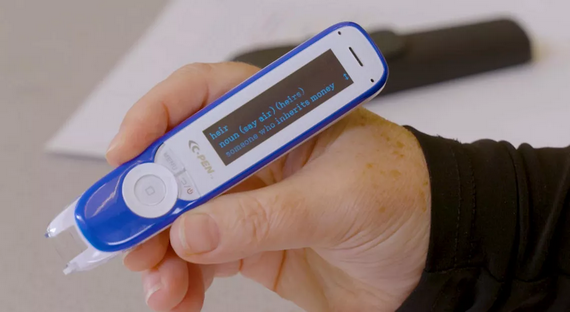
The ReaderPen Secure allows incarcerated individuals to access reading materials and engage independently in their education
Researchers in the Werklund School of Education are finalizing an agreement with Correctional Service Canada to provide inmates with learning opportunities that will equip them for life after incarceration.
The project, headed up by postdoctoral associate Dr. Christina White Prosser, EdD'21, will pilot the use of scanning pen assistive educational technology to better understand how instructors and students can use these devices to enhance literacy learning within Canadian correctional facilities.
The model pen employed in the study ReaderPen Secure was developed by Scanning Pens Corporation for secure environments and has recently been approved for use in Canadian correctional institutions.
The handheld units do not require an internet connection to function and do not store information, which reduces possible security concerns and allows them to be used in all areas of a detention centre.
"The most critical aspect of the corrections environment is safety. So, the learning environments are very limited in terms of providing access to one-on-one learning, specialized learning or special tools," explains White Prosser.
"Any kind of technology that we're seeing inside the corrections system is vitally important because once these individuals are released, they're released into a world that's full of technology."
A complex learning community
Students use the pen by sliding it over a word or sentence that is then displayed on the screen; to assist with decoding, the text is simultaneously read back to the learner. The unit can be set to read one word, one sentence or an entire paragraph. Users have access to multiple dictionaries, and earbuds provide a quiet reading space.
The Mitacs Accelerate Industrial Postdoc project follows a similar initiative carried out in the United Kingdom but is the first peer-reviewed analysis conducted in Canada.
Plans are to work with inmates from the Drumheller Institution, Saskatchewan Penitentiary and William Head Institution. Students who have agreed to participate in the three-year study will attend a course in the learning classrooms of their respective facilities that focuses on building literacy skills. Learners can use the pens for independent study and instructors will have access to a class set for group work.
Though White Prosser is working with minimum security students, a history of addiction, abuse and trauma as well as learning disabilities, including dyslexia, Asperger's Syndrome, autism spectrum disorder and attention-deficit/hyperactivity disorder, are common among this contingent.
While we only have five to 10 per cent of neurodiversity and learning disabilities in Canada, over 40 per cent of the populations inside schools in corrections have learning disabilities or are neurodiverse.
Despite the level of complexity these challenges pose, education can have a significant impact on the futures of inmates. Previous studies, White Prosser says, have found that incarcerated students who participated in educational programs, whether academic upgrading, vocational training or the development of soft skills such as anger management, were 43 per cent less likely to reoffend than those who did not.
Contributing to success after incarceration
Because the stakes are so high and because typical teaching tools and practices may not be a good fit for this population, educational administrators working in corrections annually review proposals for programs that will provide students with pedagogically sound learning opportunities.
Interest in the scanning pens study has been strong at both the federal and provincial level.
"General feedback from administrative and governing levels is positive. Instructors across both federal and provincial systems have been eager to integrate the pen into their learning spaces."
White Prosser is hopeful that the introduction of the scanning pens will help inmates build their skill set, independence and self-confidence in order to successfully reintegrate into society when their time in custody comes to an end.
"Ultimately, what we want them to do is be successful, go out, get a career and start to grow in their career."










